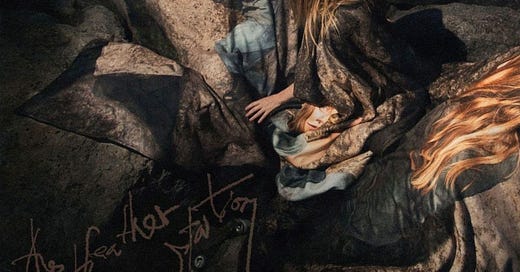Back Into My Body
An elegant new album from The Weather Station considers the treacheries of being incarnate.
The Weather Station - Humanhood
“Maybe I can get back into my body,” muses Tamara Lindeman, mastermind of The Weather Station, on a luxuriant new album called Humanhood. The entire collection is an attempt to do exactly that— to reconnect with what it means to be an incarnate human being in a world that is increasingly reduced to disembodied, digitally-mediated experience.
It’s an understandable concern for Lindeman, who found widespread critical acclaim with her terrific 2021 album Ignorance. That album was beset by climate anxiety, manifesting exterior perils as internal dread, and it thrust Lindeman into a role of more prominent advocacy for ecological stewardship and mental healthcare. But where much of Ignorance was concerned with planetary matters, Humanhood offers a more narrowly-focused existentialism— one concerned with what it means to have a body, and to sometimes feel estranged from it.
In one of the standout songs on Humanhood, a gently-pulsing anthem called “Body Moves,” Lindeman reckons with all the ways in which biological impulses and chemical signals can direct— or misdirect— our actions. “You made it so you had to undress/ the body that’s beneath all of this,” she sings, suggesting mindful interrogation of underlying physiological forces.
Elsewhere, Lindeman’s songs consider how communion with the natural world can reaffirm our humanity— connecting the pleasures of physicality to some of the ecological concerns she explored on Ignorance. The title song revels in sensuality, recalling an outdoor swim in purely tactile terms: “I was changing in the bushes/ Strip the clothes from my thighs.” It’s a sense memory that helps Lindeman understand the profundity of being bodily present in a specific time and place— that she’s more than just a mind or a soul.
If nature represents a place where humanhood is nourished, the city is a place where it’s endangered. In the driving “Neon Signs,” the forces of consumerism stand ready to ensnare: “Every neon sign, every flashing light tries to fool you… Everybody swears they need you/ And only you to make the buy.” Here and elsewhere, physical humanity is something to be stewarded and protected against efforts to render it a mere commodity.
It’s fitting that these songs, which celebrate the physical and the sensual, are both more kinetic and more lovingly detailed than the ones on the last Weather Station album, the spare and reflective How is it That I Should Look at the Stars. Album highlights include a number of sleek, propulsive piano pop tunes; “Neon Signs” and “Body Moves” possess such easeful hooks, such sneaky momentum, they could almost pass for 1970s soft rock hits.
The Weather Station’s music is generally too ruminative to for the dancefloor, yet Humanhood is not without some locomotive moments of rhythmic exploration. The title song opens with a subtle groove concocted from electronic bleeps and what sounds like a clanging cowbell. Over four minutes, it sustains its agitated energy.
Lindeman is once again working with a full range of textures, including string orchestrations and colorful jazz arrangements, just as she did on Ignorance. Humanhood contains some of her most evocative, imaginative sonic flourishes yet: “Mirror” fades in and out of a horn-drenched blur, as it to mirror an ebb and flow in the narrator’s lucidity; “Irreversible Damage” is bolder still, placing spoken-word dialog in the backdrop of an ever-shirting, freewheeling arrangement. It could be that Lindeman is mimicking the way our internal voices have to strain to be heard amongst the cacophony that surrounds us.
Lindeman’s craft— her graceful conjuring of jazz, singer/songwriter, and pop sensibilities— has never felt more seamless than it does here. That means that Humanhood goes down easy, but also that it can be tempting to overlook how richly textured the album is. The handful of instrumental (and almost-instrumental) numbers, which marshal a full array of woodwinds and strings, are so frictionless they almost blend into their surroundings.
And yet there is plenty of tension, existential in nature, roiling just beneath the surface. In the vulnerable closer “Sewing,” Lindeman sings about her humanity as a patchwork of experiences, many of them painful— “This blanket I seem to be making/
From pride and shame, beauty and guilt.” Meanwhile, the title song offers a simple mission statement: “I've been carrying this humanhood/ Tryna makе good on it.” Throughout the album, Lindeman does exactly that— and offers a paradigm for us to do likewise.
My rating: 7.5 out of 10.





